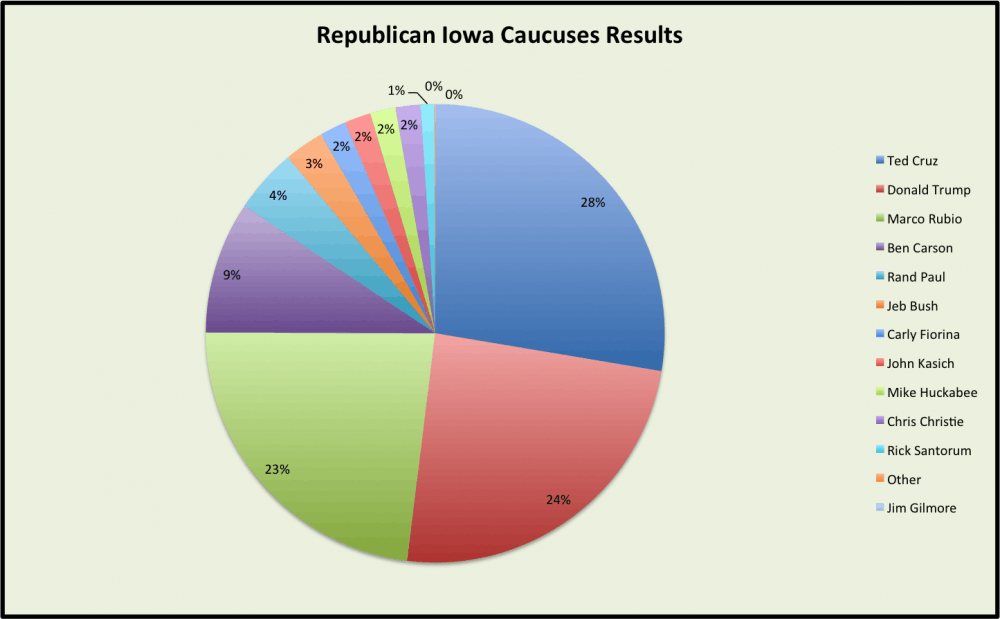Five Major Takeaways from the Iowa Caucuses:
- Trump finished second in the Republican caucuses, trailing Cruz by 4 percent
- Sanders had an emotional win against Clinton ending in a virtual tie
- Rubio placed third in his party's caucuses and was just 1 percent behind Trump
- Mike Huckabee and Martin O'Malley announced they would suspend their campaigns
- Carson finished at 9 percent while Paul held strong at 4 percent
Sen. Ted Cruz (R-Texas) sealed a victory in the Iowa caucuses Monday night after a hard-fought campaign against front-runner Donald Trump.
“Tonight is a victory for the grassroots," Cruz said. "Tonight is a victory for courageous conservatives across Iowa and all across this great nation."
Cruz finished the night at 28 percent while Trump came in second, narrowly edging out Sen. Marco Rubio (R-Fla.). Trump, who has branded himself as a winner throughout the course of the 2016 election, kept his speech brief.
While other candidates focused their speeches on policy-related issues, Trump simply thanked his supporters and said he plans to win New Hampshire and go on to secure the nomination.
“We will go on to get the Republican nomination and we will go on to beat Hillary [Clinton] or Bernie [Sanders] or whoever the hell they throw up there," Trump said.
Though Cruz was the clear winner on the Republican side, there was no clear winner in the Democratic caucuses.
Former Secretary of State Hillary Clinton secured an early lead as initial results came in. But as the night progressed, Sen. Bernie Sanders (I-Vt.) narrowed the deficit. The results from the second to last precinct revealed Clinton won with 49.9 percent of state delegate equivalents to Sanders' 49.5 percent. Sanders announced earlier this morning he would contest the results.
Before Sanders and Clinton left Iowa to fly to New Hampshire, they delivered speeches to their supporters. Sanders declared the race a virtual tie and moral victory while Clinton declare a statistical victory.
Clinton, who was considered the main front-runner of the Democratic Party entering the Iowa caucuses, now finds herself in a tighter race than initially expected.
"I am excited about really getting into this debate with Senator Sanders about the best way forward to fight for us and America," Clinton said.
Clinton and Sanders share a virtual tie, but Clinton narrowly edges out Sanders by 0.4 percent of state delegate equivalents. Note: 100 percent of votes reported.
Unlike the Republican Party caucuses where individual votes are recorded and made publicly available, the Democratic Party releases information about the corresponding number of delegates each candidate will have sent to the state convention.
Clinton got 49.9 percent of the delegates while Sanders got 49.5 percent. Former Gov. Martin O'Malley (D-Md.) captured the remaining 0.6 percent.
While the tangible results are important, Sanders captured an emotional win.
“As I think about what happened tonight, I think the people of Iowa have sent a very profound message to the political establishment, to the economic establishment, and, by the way, to the media establishment," Sanders said.
He added that he was moved by the turnout and was pleased with how far his campaign has come within the past nine months.
"Nine months ago, we came to this beautiful state," Sanders said. "We had no political organization, we had no money, we had no name recognition and we were taking on the most powerful political organization in the United States of America. And tonight, while the results are still not known, it looks like we are in a virtual tie.”
David Gergen, a political correspondent at CNN who will headline Elon University's 2016 Commencement ceremony, said Iowa voters shook up the political landscape and made the race for the Democratic nomination particularly interesting.
"Iowa, instead of resolving anything, has thrown everything up in the air," Gergen said.
Iowa also surprised the nation with a high turnout of Rubio supporters. Rubio claimed the third spot on the Republican leaderboard, earning 23 percent of the total votes.
"This is the moment they said would never happen," Rubio said. "For months they told us we had no chance."
Rubio added that his success in Iowa signaled voters' desires to transform the leadership structure in Washington, D.C.
"Here in Iowa, the people of this great state have sent a very clear message: After seven years of Barack Obama, we are not waiting any longer to take our country back," Rubio said.
With the exception of Sen. Rand Paul (R-Ky.) coming in fifth place, there were little surprises in the order of the rest of the field of Republican candidates.
Retired neurosurgeon Ben Carson came in fourth with 9 percent while Paul and former Gov. Jeb Bush (R-Fla.) received 4 percent and 3 percent of the votes, respectively.
Former CEO Carly Fiorina, Gov. John Kasich (R-Ohio), former Gov. Mike Huckabee (R-Ark.) and Gov. Chris Christie (R-N.J) came in at 2 percent.
Sen. Rick Santorum (R-Pa.) and former Gov. George Pataki (R-Ny.) received 1 percent and 0 percent, respectively.

Results from the Iowa caucuses reflect a three-candidate race for the Republican Party presidential nomination between Cruz, Trump and Rubio. The three candidates combined for 75 percent of the total votes with Cruz recording 51,649 votes. Note: 100 percent of votes reported.
While candidates like Rubio and Sanders garnered more votes than expected, others ended their campaigns because of disappointing results.
Huckabee and O'Malley announced they would suspend their campaigns, narrowing the field of Republicans to 11 and Democrats to two.


